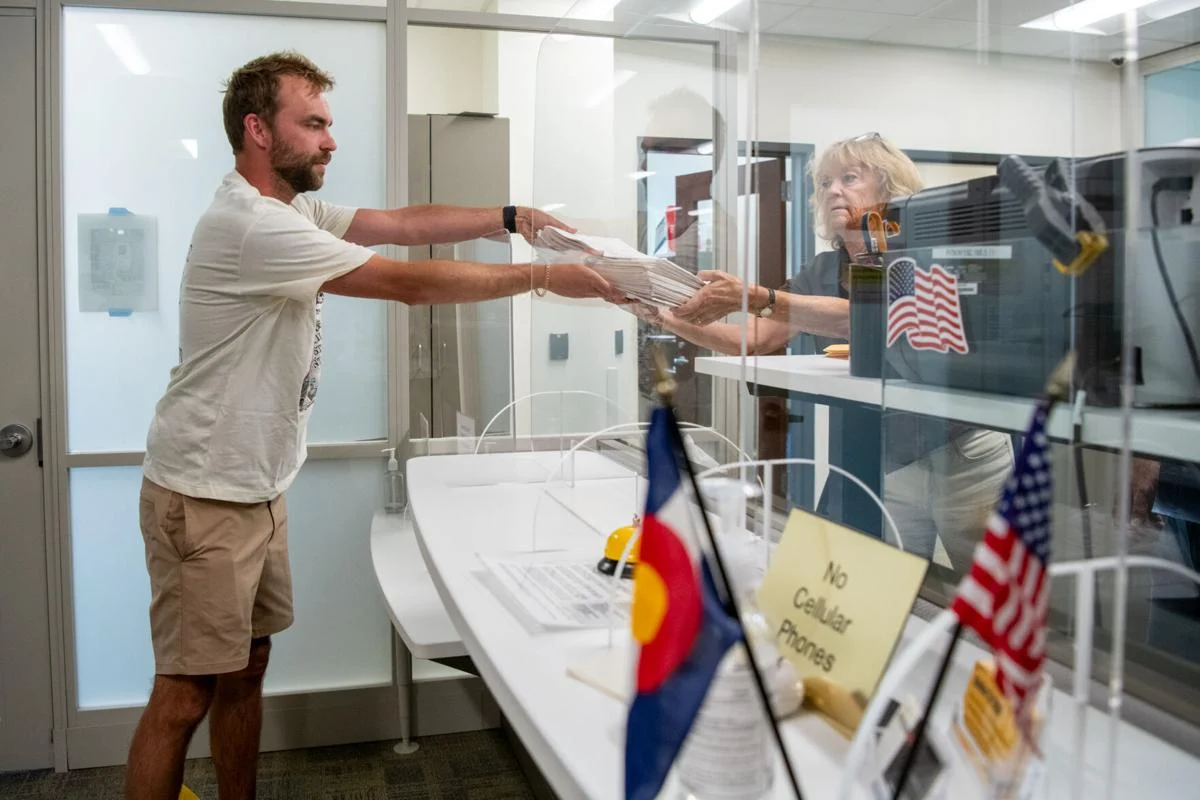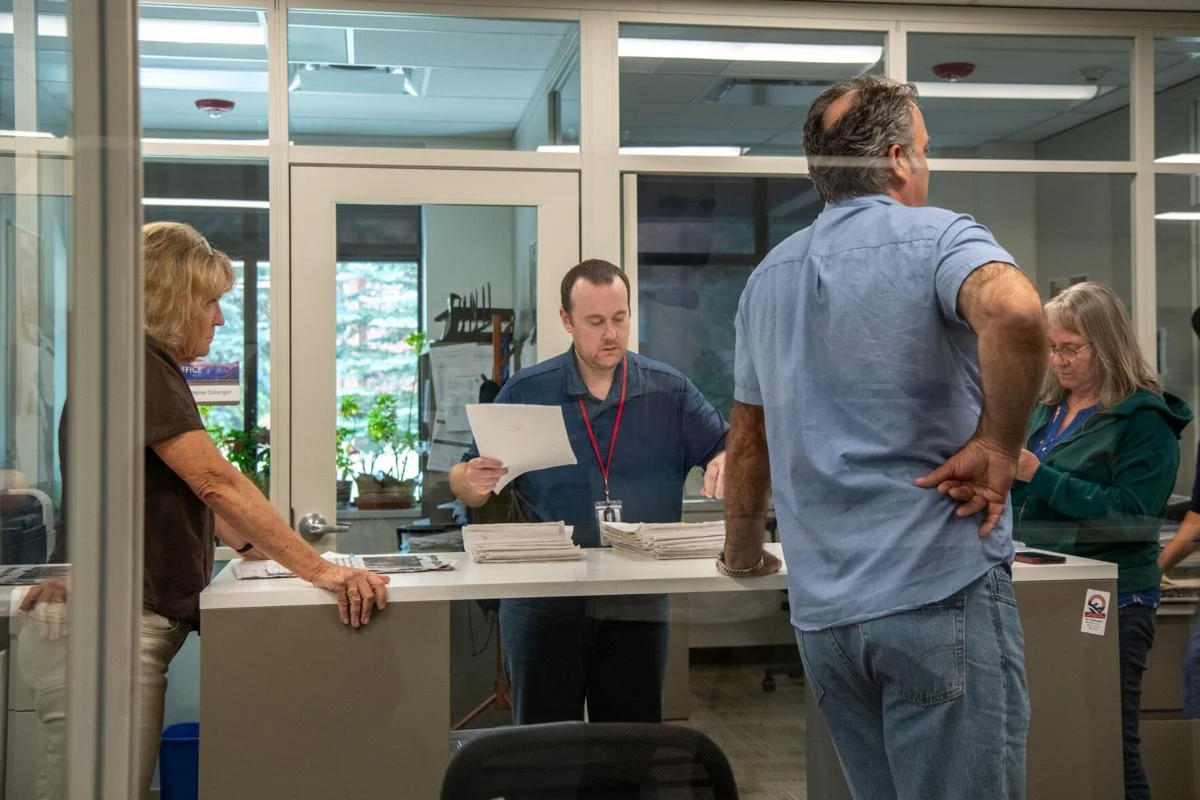

A small pack of Citizens Against Bigger Planes members, donning matching T-shirts of Hunter S. Thompson choking on a Boeing 737, submitted their charter amendment petition packets to the county Wednesday, the latest step in their effort to force a vote on the runway expansion at the Aspen-Pitkin County Airport.
Chuck Butler, a founding member of the group, said that 21 volunteer petition circulators collected 1,202 signatures across 47 packets.
“This was a grassroots community effort,” he said. “We have elected officials for a reason — I wholeheartedly agree with that. But if [the Pitkin Board of County Commissioners] is not representing what I've been calling the silent majority of the Pitkin County population, then their execution isn’t in the community's best interest.”
The signatures were collected in pursuit of a Nov. 7 general election ballot question that would ask Pitkin County voters to amend the Home Rule Charter, the county’s governing document, to block county authority on the “expansion or relocation of any runway at the Aspen-Pitkin County Airport” without voter consent. It also provides an official definition for “runway” in the county.
If passed, the new language in the Home Rule Charter would force a public vote on whether to shift the airport runway 80 feet to the west and widen the runway-taxiway expansion from 320 feet to 400 feet, allowing for the full breadth of Airport Design Group III aircraft access to the airport.
The commissioners previously voted to plan for a runway shift 80 feet to the west and included the runway-taxiway expansion in airport planning documents that are now with the Federal Aviation Administration.
County and airport staff have maintained the FAA would not allow the county to maintain its narrower separation, as it’s a question of access and safety at the airport. But Citizens Against Bigger Planes and nonprofit Aspen Fly Right argue that allowing wider-wingspan aircraft would be detrimental to local public health and safety, culminating in a push for a community vote on the airport’s future.
Clerk and Recorder Ingrid Grueter said that the group must collect 771 signatures from Pitkin County electors for the ballot question to appear on the ballot. The threshold is based on the number of registered voters in the county.

The clerk’s office has 15 days to certify the signatures are all from current registered Pitkin County voters, though the office is aiming to finish by the end of next week. Since the Home Rule Charter does not specify a specific date, Grueter said, the clerk’s office is using the packets’ date of submission.
Some disqualifying features would be the inability to verify a signatory’s identity by name and address, a signatory registered to vote outside of Pitkin County, or any other mismatched data between the signature and Pitkin County voter records.
Another disqualifying feature would be if a signature was signed and dated after the notary stamp on each packet.
Each rejected signature will receive another examination by a different county employee, said elections specialist Jeff Limongelli.
If enough signatures get nullified to put the total count below 771, Citizens Against Bigger Planes would be allowed time to cure signatures deemed invalid. The state deadline for finalized ballot measures is Aug. 25.
The group has been out collecting signatures since late June, after the Clerk and Recorder’s Office approved three different packets for signatures.
“I think this gave us the best opportunity to carry on the conversation and educate more people,” Butler said. “And then ultimately have the county commissioners do what they did 30 years ago and talk to the FAA with the will of the people in mind.”
Petition organizers have attended events like the Snowmass Rodeo, local sporting events and Fourth of July parties to collect signatures.
Butler said that the majority of people who signed agreed with the group’s position that an expansion of the airport would be a bad thing.
Landon Hartstein, another volunteer with Citizens Against Bigger Planes, said that some signatories added their names even though they disagreed with the group's position, but believed the community should still have a say.
Butler said that if the ballot question makes it to November and voters reject the measure, he would be OK with that.
“If the voters don’t agree with us, then I think the people have spoken,” he said. “There’s not much else we can do if the people don’t agree with us.”
As long as a sufficient number of signatures are certified, the next step in the process would be for the county to certify a title for the ballot question — a decision that Butler said Citizens Against Bigger Planes would follow closely.
County commissioners recently held an executive session discussion on “ASE (Pitkin County Airport) ballot measure procedure” and discussed the possibility of writing their own ballot question to rival Citizens Against Bigger Planes.
Commissioner Patti Clapper said the board hasn’t decided on whether to move forward with their own airport ballot question.
“They are considering whether or not the board should put [a ballot question] on the ballot and what the consequences might be,” said County Manager Jon Peacock.
If the board did decide to add its own ballot question, it would have to meet the statutory deadlines for ballot language submission, which are all coming in the next month.
Assistant County Attorney Laura Makar said that the board has the power to call special meetings for first and second reading of any county-authored ballot question.
For one packet, the instruction pages had been separated from the signature pages. Butler stapled them back together just before submitting them to the clerk.
Grueter said if the signature pages were not intact via staples, then that would have disqualified the packet and all the signatures. Since the signature pages were still stapled together, however, she said that did not disqualify the signatures.
The town of Basalt experienced a similar problem with a citizen initiative petition and staple holes in the packet in the spring. Ultimately, the signatures were found to be valid but the ballot question — which related to parking spaces downtown and the infrastructure Midland Avenue Streetscape Project — failed during a special election.